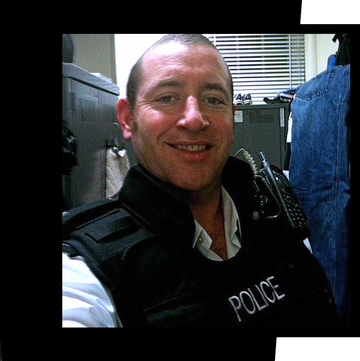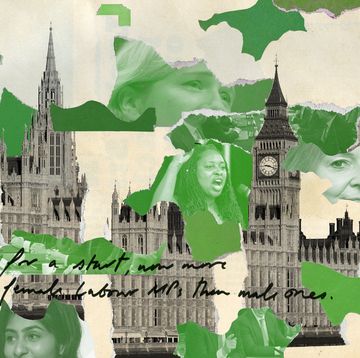One morning when I was 15, I ran out of energy as I walked to a lesson at school.
I sank down to rest my face on a frosty path, and couldn't get back up. I
had been ill with glandular fever the previous summer and returned to school a week late but life was busy: it was the summer of 1995, I was an A-grade student, taking extra subjects and fencing at a national level.
There was no time for me to be unwell.
The school nurse thought I was faking it. My GP at home was sympathetic, but suggested I needed rest. I couldn't understand it: I knew there was something physically wrong with me, but no one could diagnose it or tell me how long it would last. It was frightening, belittling, and it felt unfair.
Not only was I unwell but I was lost in despair that no one would validate what I was going through.
I couldn't get out of bed and could see a helpless panic in my parents' faces. The following spring, when my exhaustion had evolved into severe joint pain and photosensitivity, a specialist at last gave my condition a label: post-viral fatigue syndrome (PVFS). People became more understanding and I could breathe a sigh of relief. There was a medical problem with a name. My inability to get well was legitimate.
PVFS, sometimes put in the same medical bracket as chronic fatigue syndrome (CFS) or myalgic encephalomyelitis (ME), is far more widely recognised now than it was in the Nineties, but it continues to court controversy.
It's by no means the only illness involving chronic pain that has no definitive organic cause, but there is an epidemic of suffering out there that is being stigmatised as 'made up'.
Up to one third of patients coming to GP surgeries today have symptoms that are medically unexplained*.
It is these people whose problems are examined by neurologist Dr Suzanne O'Sullivan in her Wellcome Prize 2016-winning book, It's All In Your Head. First published last summer, it was a revelation for me, even now at 36 years old.
In it O'Sullivan argues a case for psychosomatic illness, where symptoms as severe as blindness and paralysis are triggered by the mind rather than disease.
After the release, she came under fire and was trolled on Twitter by the medical world and ME sufferers, due in part to the fact she connects ME to a long list of mind-based illnesses.
'The scientific peer review system is in meltdown [and] O'Sullivan's pseudoscience being taken seriously proves it,' read one. Dr Max Benjamin, a clinical psychologist at Imperial Collegetweeted: 'How on earth this won I have no idea. Pseudopsychoanalytic, lazy, unevidenced explanations of unexplained illnesses.'
O'Sullivan is cautious about delving into the controversy. 'I have to be careful, as I will get it in the jugular,' she tells me, sitting in her office at the National Hospital for Neurology and Neurosurgery.
'It saddened me to see that people still feel that it's necessary to rail against such a common medical problem. It made several of my patients feel like they were being attacked and judged.
'We don't query physical symptoms like blushing when we're embarrassed, or feeling sick when we're nervous,' O'Sullivan adds.
'But we resist the idea that physical illness could have psychological roots.' She explains that in order to move forward in this field of medicine, as a society we need to shrug off a suspicion that those suffering mind-based illnesses should be able to pull themselves together.
'Psychosomatic symptoms, which are also called "functional" or "dissociative", are not imagined. Illness that comes from the mind can be life destroying and must be given the same respect as illness coming from a physical disease.'
The difference is these illnesses could be treated more effectively with psychotherapy than medicine. My 15-year-old self wants to jump across the desk and hug her.
The idea that the mind can cause illness in the body is as old as Hippocrates, who wrote about it in 400BC. For centuries psychosomatic disorders were known as hysteria and believed to be a feminine complaint, deriving from disturbances in the womb. And remarkably, while all ages, ethnicities and races suffer from CFS today, 70% of patients are women**.
'I resisted this statistic,' O'Sullivan continues. 'When I was training I was surrounded by male doctors who had the attitude that men couldn't have a psychosomatic illness, which is dangerous because 30% of patients are men.'
Many medical schools still barely cover functional disorders and not all doctors know about it. O'Sullivan regularly receives letters back from the doctors of patients querying her diagnosis. 'I often hear: please can you reconsider, they are "not that sort of person". Well, who is "that sort of person"?'
Marina†, 32, is one of O'Sullivan's patients. She was 16 when she was briefly unwell with a virus. She was diagnosed with CFS and advised by a doctor to drop out of school. Instead she kept going, making it through a degree at Oxford University to become a successful designer.
Throughout she was plagued by symptoms and diagnoses, ranging from endometriosis to arthritis. 'The symptoms were hard, but far harder was not knowing what was wrong with me,' she says. 'I was given 29 different diagnoses over the years. Despite my best efforts, I watched terrified as my life dissolved around me. I had to give up a career and a home I loved. I lost friends,' she says. 'It was traumatic; I had to gather all the strength I could. I've never felt so afraid.'
After two months in hospital with gynaecological problems, Marina was referred to O'Sullivan. 'She was the first doctor who really listened to me, looked at the whole of me, and took time to make me feel understood. Without Suzanne, I don't think I would still be here.'
With ongoing help from O'Sullivan, cognitive behavioural therapy (CBT) and neurological therapists, Marina learned the techniques to help her live with her illness. 'There are times when I've been angry that I wasn't diagnosed sooner. It's shocking that it took 16 years.'
Talking to Marina, my hairs stood on end. I remembered how I'd limped around endless clinics but was eventually put in touch with a doctor who, like O'Sullivan, unpacked my symptoms and gave me an achievable path to a recovery, which involved CBT ('This week I will walk 100 steps each day; next week I will walk 115 steps').
After a year, I was well enough to go to university, and I haven't had the pain nor the fatigue since. In fact, it's been hard digging up the memories for this piece.
Today people meeting me are unlikely to guess I was ill; I'm a self-confessed health nut. But even though I've moved on, it makes me angry to think how many others are being accused of 'faking it'.
'A psychosomatic diagnosis is worse in many ways,' O'Sullivan concludes. 'It's hard for the patient to understand and there's no tablet that can be given. The one good thing is that if it's correctly diagnosed, it can be curable.'
Even Marina is hopeful.
'There are periods when I am afraid. But as time goes on, I feel increasingly confident that I have been through the worst and survived.'
ALL MADE UP?
Up to one third of patients coming to GP surgeries have symptoms that cannot be explained in terms of a disease.*
70% of patients who suffer from psycho-somatic illnesses are women.**
People with medically unexplained symptoms visit their doctors twice as often as other people.***
The misdiagnosis rate in people with psychosomatic neurological symptoms is only 4%.‡
Medically unexplained symptoms are estimated to cost the NHS £3bn per year.§
HEADSPACE
Don't suffer in silence. Get the best advice on psychosomatic disorders:
Neurosymptoms.org - Run by neurologist Dr Jon Stone, this has a lot of information on causes and treatment.
Fndhope.org - A site created by patients about how to live with functional neurological disorder.
Nonepilepticattacks.info - Written by those suffering non-epileptic attacks.
Meassociation.org.uk - Information, support and practical advice for people, families and carers affected by M.E. (Myalgic Encephalopathy), Chronic Fatigue Syndrome (CFS) and Post Viral Fatigue Syndrome (PVFS)
*Jackson and Passamonti 2005. **Ahmed & Talal 1989. †Name and some details have been changed. ***psychologies.co.uk 2016. ‡J Stone et al 2005. §wmscnsenate.nhs.uk 2016.













